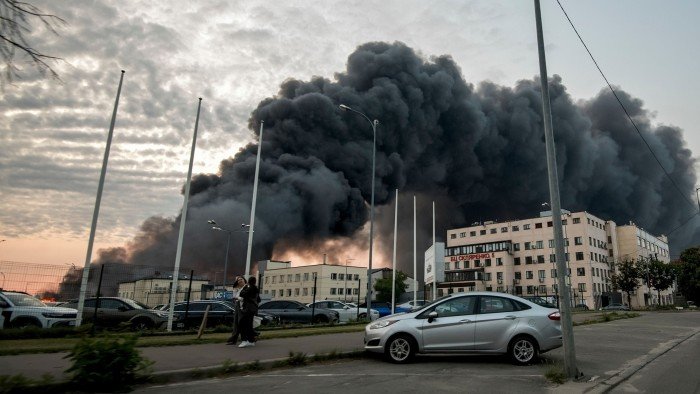Russian missiles slammed into a Boeing facility in Kyiv during one of the war’s most intense air attacks this week. The strike appears deliberate. Six sources familiar with the matter confirmed the targeting of the US aerospace giant’s operations.
Sunday night’s barrage was massive. Russia launched 315 drones, two ballistic missiles and five cruise missiles at Ukrainian cities. The Boeing building took a direct hit during this overnight barrage Sunday into Monday. Images from Ukraine’s emergency service show severe damage. Fires raged inside the facility.
No Boeing employees were hurt. But the symbolism runs deep.
Boeing isn’t just any American company in Ukraine. It’s one of the most prominent American businesses operating there. The company employs over 1,000 people across Ukraine. It partners with Ukrainian aircraft maker Antonov on defense projects. Heavy transport aircraft. Military-capable designs. The kind of stuff that matters in this war.
“Russian strikes on American companies in Ukraine are yet another example of Putin’s disregard for US peace efforts,” Ukrainian Foreign Minister Andriy Sybiha said. The targeting sends a message. It’s not subtle.
Boeing and Antonov signed cooperation deals last year. They’re working on ammunition and aerial strike systems. Unmanned aerial vehicles too. Ukrainian Defense Minister Rustem Umerov met with Boeing executives at the Munich Security Conference in February. They discussed joint production of weapons systems. The Ukrainian defense ministry said at the time the talks focused on manufacturing ammunition and strike capabilities.
Russia has been hitting industrial targets hard lately. Antonov plants. Power stations. Defense production sites. Ukrainian officials say Moscow wants to cripple the country’s ability to make and repair weapons. The Boeing strike fits this pattern.
Despite the damage, Boeing’s Ukrainian operations continue running. “No operational disruption,” said Andriy Koryagin, deputy general director of Boeing’s Ukraine operation. The company was actively hiring as recently as June. A job posting showed Boeing looking for an aircraft interior design manager in Kyiv.
This attack could complicate things for President Trump. He’s already frustrated with Moscow’s escalating behavior. Russia has renewed ground offensives in eastern Ukraine while peace talks stall. Putin’s demands remain maximalist. Uncompromising.
The strike raises bigger questions too. Is Russia expanding its target list to include Western companies with defense connections? US and European officials warn about escalating Russian sabotage campaigns across Europe. Many target companies shipping weapons to Ukraine, according to the Center for Strategic and International Studies.
American businesses in Ukraine have paid a heavy price throughout this conflict. Andy Hunder, president of the American Chamber of Commerce in Ukraine, knows the toll. Thirty-two percent of the chamber’s nearly 700 members have lost employees to Russian attacks since 2022. Nearly half reported damage or complete destruction of facilities.
The stories are grim. Russian forces occupied and destroyed a Coca-Cola facility in the Kyiv region during the 2022 invasion’s early days. Soldiers found a stash of Jack Daniel’s whiskey there. They drank it all and passed out, actually slowing their advance toward the capital. Dark humor in wartime.
Cargill lost facilities too. Russian forces seized one during the 2014 invasion of eastern Ukraine. Another fell in Kakhovka.
Boeing’s damaged building joins this growing list. But the company’s partnership with Ukraine’s defense industry makes this strike different. More targeted. More deliberate.
Moscow’s message is clear: American companies supporting Ukraine’s war effort aren’t safe. Even in the capital. Even with over 1,000 employees on the ground.
The war grinds on. Companies adapt. But Sunday’s attack shows Russia’s willingness to directly target prominent American businesses. That calculation could change things in Washington.
For now, Boeing keeps operating. Its Ukrainian employees keep working under dangerous circumstances. The company praised their resilience. They’ll need it.



